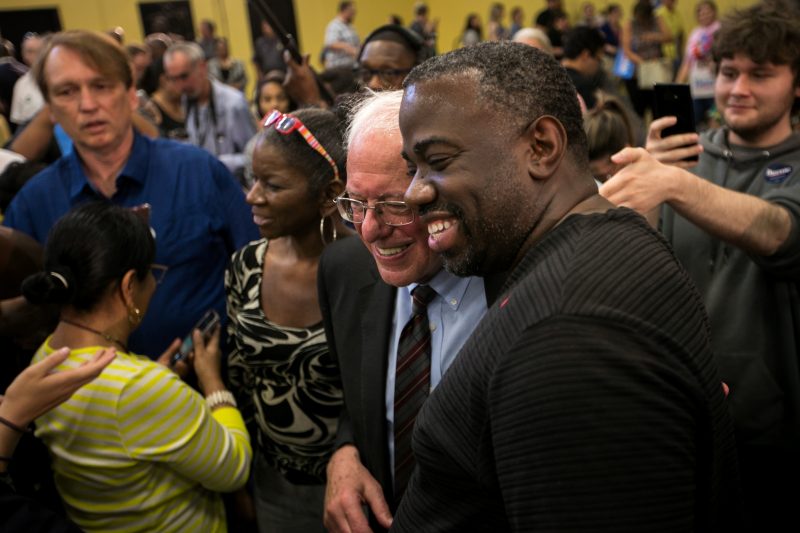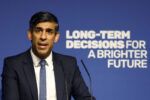Democrats head south to woo crucial US demographic: black voters
White House hopeful Bernie Sanders greets supporters following a speech in Rock Hill, South Carolina on June 23, 2019 (Logan Cyrus)
Rock Hill (United States) (AFP) – Breaking bread, attending church services or visiting historically black universities, Democratic candidates descended on South Carolina last weekend appealing to African-American voters, a potential key to victory in their race for the White House.
More than 20 candidates seeking to challenge the Republican Donald Trump flocked to the southeastern state courting a demographic that, while just 12 percent of the US population, could play an outsized role in picking the 2020 Democratic nominee.
Adressing a cheering crowd of 600 in the small city of Rock Hill on Sunday, liberal senator Bernie Sanders accused Trump of seeking to “divide us up” along ethnic lines — while his own campaign was bringing people “together.”
“It brings us together in the struggle for economic justice, for social justice, for racial justice and for environmental justice.”
The gathering was in a gymnasium on the campus of Clinton College, founded in the late 19th century to accommodate black students, and 40-something voter Stephonia Wright appreciated Sanders’s choice of location.
She has yet to decide among the two dozen Democrats in the field.
They include ex-vice president Joe Biden, who leads national polls and is a favorite among African-Americans; Senator Kamala Harris, who is black; and Pete Buttigieg, the young mayor of South Bend, Indiana who faces a crisis back home after the killing of a black man by a police officer.
“This is so thick,” a smiling Wright told AFP of the crowded race. “So we’re going to have to wait ’til we get closer to the primaries (to see) who emerges from the ashes.”
Until then, candidates are tripping over themselves wooing voters in a state where blacks represent a majority of the Democratic electorate.
They could prove all the more decisive in choosing who faces Trump in November 2020, as South Carolina is the fourth of 50 states to vote in the nomination process, and the first with such a prominent black population.
The victor here could benefit from strong black support throughout the campaign.
Hence the political passion that seized the capital Columbia last weekend, when virtually all major Democratic candidates piled in to attend multiple large-scale events and host smaller meet-and-greets to reach out to voters one on one.
On Friday, Kamala Harris, the daughter of Jamaican and Indian immigrants, held court with an intimate group of women.
Senator Cory Booker, another prominent black candidate in the historically diverse field, was warmly welcomed at a Columbia parish’s faith breakfast Saturday, while Sanders delighted customers with a surprise stop Sunday at a Rock Hill restaurant.
But it is Biden’s name that currently resonates, largely due to the 76-year-old’s eight years as the right hand man to the nation’s first African-American president Barack Obama, beloved among black voters.
Biden “can get the country back on track,” assured Eva Gordon, 75, who arrived in her Sunday finest at Zion Baptist Church, a center of Columbia’s 1960s civil rights struggle.
– Exaggerated controversy –
And what of the firestorm touched off by his recent remarks recalling the “civility” with which he and two avowed segregationists worked together during Biden’s early years in the Senate?
“It seemed… blown out of proportion,” said 65-year-old Ida Washington, who came to listen to Biden and several other candidates at the famous fish fry hosted by popular African-American congressman James Clyburn, who also rushed to Biden’s defense last week.
The urgency confronting Buttigieg in Indiana, where a fatal shooting of a black man by a white police officer has set his city on edge, has highlighted how the thorny issue of race has crept into the 2020 campaign.
The shooting forced Buttigieg to return home, missing Clyburn’s event, and a prime opportunity to introduce himself to thousands of black voters.
“A lot of African Americans identify as moderate as opposed to liberal and that may also be helpful to Biden” at this early stage in the race, said Kyle Kondik of the University of Virginia’s Center for Politics.
The African-American electorate is “not a monolith,” explained Johnnie Cordero, chairman of South Carolina’s Democratic Black Caucus, at a gathering for millennial black voters where candidates joined in eating from platters of spicy chicken wings.
But there are a number of issues that draw attention across the black electorate, including wealth inequality, criminal justice reform, and whether the US government should pay reparations to Americans harmed by slavery and its legacy.
“Those are the issues that the candidates need to be addressing if they want the support of the black community,” Cordero said.
Disclaimer: Validity of the above story is for 7 Days from original date of publishing. Source: AFP.


